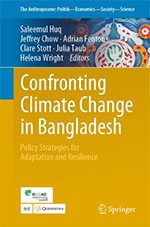APESS
Vol 28 |
Saleemul Huq, Jeffrey Chow, Adrian Fenton, Clare Stott, Julia Taub, Helena Wright (Eds.): Confronting Climate Change in Bangladesh. Policy Strategies for Adaptation and Resilience (Cham: Springer International Publishing, 2019).
ISBN: 978-3-030-05236-2 (Softcover)
ISBN: 978-3-030-05237-9 (EBook)
Doi: 10.1007/978-3-030-05237-9_ (add chapter no.)
Order this book on Springer Website
|

|
- Showcases the wealth of experience with adaptation and resilience in Bangladesh
- Draws from expert practitioners across the numerous sectors affected by climate change
- Highlights key lessons for other Least Developed Countries
Due to its vulnerability to a wide variety of climate change impacts, Bangladesh has become a laboratory for adaptation and resilience strategies in the developing world. The knowledge shared by experienced practitioners who have a deep understanding of the complex context of this country is an invaluable resource. The International Centre for Climate Change and Development has brought together a host of experts across multiple disciplines to provide a detailed look at Bangladesh's ongoing struggle to prepare for the inevitable threats that climate change poses. This volume presents public policy-oriented strategies across numerous sectors, including agriculture, freshwater management, forests, finance, human rights, health systems, flood control, infrastructure, solar energy, and more. Successes and shortcomings both provide useful lessons for other countries grappling with similar climate threats. This book offers the latest research findings for a wider audience. |